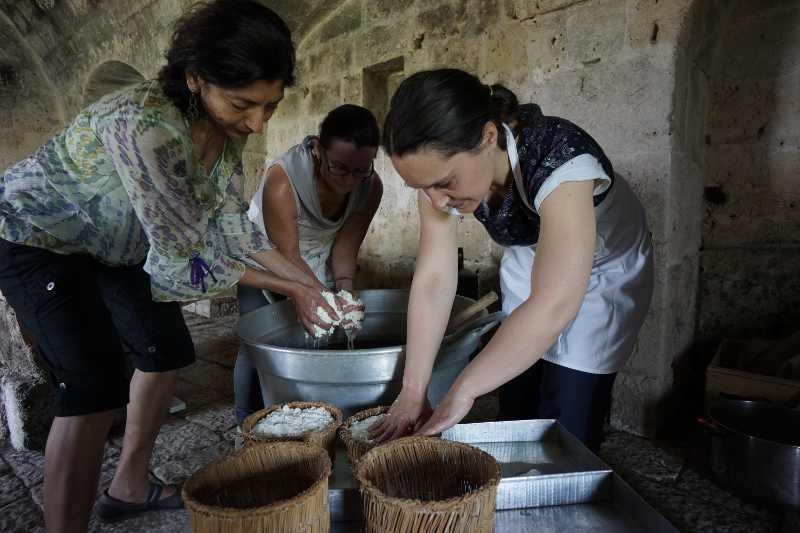Italy: Go Rural. Go Now
Don't let the title deceive you; On your inaugural Italian vacation, it's imperative that you visit the Italian big three, the big cities everyone tells you to visit, namely Rome, Venice, and Florence. The diversity in art, architecture, cuisine and lifestyle will astound you. The hidden secrets will amaze you.
But then what? You could head off for another popular destination, say the Cinque Terre. It's rural, full of eye candy, and it's got a whole lot of tourism resources. Rick Steves likes it. It's become so popular you don't have to speak Italian there any more. You might have to walk a bit to get the full effect of seeing the villages from all angles, but walking is good for you.
The Cinque Terre is easy—and it's safe--unless you trip on the overworked and rapidly crumbling pathways.
But there are some of us, curmudgeons all I suppose, who immediately question the value of anything safe and easy. For us, there are few rewards that fork from these lazy attributes.
We want to eat food that isn't heavily contoured to be safe to set before tourists. We want to slowly push open the creaky door inside a church and descend into a gem of a crypt held up by re-used Roman columns. We want to walk into a field and find the unguarded remains of a Roman village. These are rural delights, plain and simple. Italy is full of them.
We don't mind being invited to share a shepherd's cheese or to have our rental car slowed by a flock of oblivious sheep and their omnipresent guardian, a whip-smart dog with darting eyes and a sharp bark. Indeed, we see this as eye candy:

We find what we've lost, an ageing, tranquil landscape. We imagine an idyllic life, a life of just enough. A life of handmade cheese and artisan-woven, woolly outer-garments perfect for the chill. This is Puglia, an Italian region of great promise for tourism.
But it's all going away. As we lust after what we've lost, the same forces are coming to destroy this idyllic life.
The shepherd you see in the picture above is an exceedingly pleasant fellow. His livelihood, the milk of his sheep made into its portable form known as cheese, has been taken from him. He lives on the edge. He can sell the milk, but for pennies. He has lost the right to add value to the milk by making cheese.
How did this come about? The same way it always does. Large corporations, pressed by the demands of a logarithmically-driven market and looking to please their stockholders, find a way to subvert the common man's production of a product so they can monopolize the production of a cheaply made substitute. Corporations have demanded that shepherds make cheese like they do: in stainless steel. The politicians they've bribed have agreed and forged these corporate demands into law. The now-impoverished shepherd cannot afford a laboratory kitchen. He and his business partner, his wife, have always made cheese in a dimly lit outbuilding like this:

You'll notice the containers made from organic materials--as they have been for hundreds and likely thousands of years. Despite a complete lack of evidence, suddenly they are considered unclean and unsafe.
So now only big corporations can make cheese in a sterile environment, the one environment that is death to cheese flavor.
The purpose of all this is to make a plea for those of you who lust after the incredible variety of Italian cheeses and salted pig parts. Go, eat, and spread your joy throughout the land! The party is coming to an end—unless a human-scale revolution changes things.
So, my advice is to experience Italy with your heart and with your gut. Demand the best. You'll be amazed how inexpensive the best cheese is in Italy. Do you know how Italians find the very top small-production cheeses? They knock on doors in a place known for the production of milk. They track it down, in other words. They keep the fading tradition alive.
If you like to cook, take an apartment in a place like Puglia. Find a Masseria like Masseria Posta Santa Croce, go the the markets, come back with a car full of local treasures, and learn what the heart and soul of cucina povera is all about. Heck, you don't even have to cook, just buy the things people have been eating since forever--or at least until refrigeration became common.

Or pick a small city that has literally arisen from the limestone that lies just under the topsoil like Gravina in Puglia, shown above. Take the underground tour and visit the caverns that have been mined for structural blocks and then cleaned up and used for wine and cheese making and storage. Nobody died eating the cheese or wines stored in these caves, as far as I know. And the bread is special, too.
And the price for temporarily making camp here? How 'bout an apartment across from the cathedral that will set you back a mere 50 euro a night or so in the off season? The rural life equates to great value as well as good living.
If you want to forgo all the travel planning, check out the Experience Packages on this site, then just sit back and count the days before you hit the truffle and wine trail of Piemonte or bike the unknown region of the Molise. Let a qualified guide do the talking. Let's call it safe and easy the hard way; you have to supply the hard questions you want answered.
Until then, eat simply. Eat well. Then ask the question: is a world full of nothing but Cheez Whiz really worth it?

